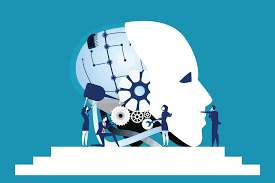Introduction to Artificial Intelligence (AI)

Artificial Intelligence, often abbreviated as AI, is a term that has become increasingly prominent in our daily conversations. From the voice-activated assistants on our smartphones to self-driving cars navigating city streets, AI is revolutionizing how we interact with technology. But what exactly does it mean?
At its core, Artificial Intelligence refers to machines designed to mimic human cognitive functions such as learning and problem-solving. As this fascinating field continues to evolve, so too do its implications for various industries and society at large. Whether you’re a tech enthusiast or just someone curious about the future of innovation, understanding AI opens doors to discussions about creativity, ethics, and even the very nature of intelligence itself. Buckle up as we journey through the world of Artificial Intelligence!
History of AI

The journey of artificial intelligence began in the mid-20th century. Pioneers like Alan Turing laid foundational theories about machines simulating human thought processes.
In 1956, the Dartmouth Conference marked a turning point. Researchers gathered to discuss how machines could be made intelligent. This event is often credited with coining the term “artificial intelligence.”
Throughout the following decades, AI experienced cycles of enthusiasm and disappointment, known as “AI winters.” Funding dwindled as progress slowed.
However, breakthroughs came with advancements in computer technology and data availability in the late 1990s and early 2000s. Algorithms became more sophisticated, enabling rapid growth.
Today, AI is woven into everyday life—chatbots assist customers while algorithms recommend products online. The past informs our understanding of what lies ahead for this transformative field.
Types of AI

Artificial Intelligence can be categorized into several types based on its capabilities.
Narrow AI, or Weak AI, is designed for specific tasks. Think of virtual assistants like Siri or Alexa. They excel in their domains but lack general understanding.
Then there’s General AI, also known as Strong AI. This form aims to perform any intellectual task a human can do. While it’s more advanced, we’re still far from achieving it.
Another type is Superintelligent AI. This concept refers to an intelligence that surpasses human abilities across the board. It remains largely theoretical and raises many questions about safety and control.
Reactive Machines are another category of Narrow AI. These systems react to current situations without memory-based learning – classic examples include chess-playing computers that evaluate multiple moves instantly.
Each type plays a unique role in the evolving landscape of technology and innovation.
Applications of AI

Artificial intelligence is transforming various fields, making processes smarter and more efficient. One of the most notable applications is in healthcare. AI algorithms analyze medical data to help diagnose diseases early, leading to timely interventions.
In finance, AI enhances fraud detection by monitoring transactions for unusual patterns. This technology safeguards sensitive information while streamlining operations.
The retail industry also benefits from AI through personalized shopping experiences. By analyzing customer behavior, businesses can recommend products tailored to individual preferences.
Additionally, autonomous vehicles rely heavily on AI for navigation and safety features. These cars use complex algorithms to interpret sensor data and make split-second decisions.
Furthermore, the entertainment sector leverages AI in content creation and recommendation systems. Platforms like Netflix utilize it to suggest movies based on user viewing habits.
With its wide-ranging applications, artificial intelligence continues to reshape industries in meaningful ways.
Potential Benefits and Risks of AI

Artificial Intelligence brings a wealth of potential benefits that can transform industries and improve daily life. For instance, AI enhances efficiency in manufacturing by automating tasks, leading to increased productivity. Healthcare also reaps rewards; AI assists in diagnosing diseases more accurately and quickly than traditional methods.
However, these advancements come with inherent risks. Job displacement is a significant concern as automation could replace human workers in various sectors. Additionally, reliance on AI may lead to ethical dilemmas, such as biased algorithms affecting decision-making processes.
Data privacy remains another critical issue. As AI systems require vast amounts of data for training, the threat of misuse or breaches looms large.
Navigating this landscape means embracing the advantages while being vigilant about potential pitfalls. Striking this balance will be essential for harnessing the full power of Artificial Intelligence without compromising society’s values or safety.
Ethical Considerations in AI Development
The rapid advancement of artificial intelligence raises crucial ethical questions. As AI systems become more integrated into our lives, the potential for bias and discrimination looms large. Algorithms trained on flawed data can perpetuate existing inequalities.
Transparency is another significant concern. Users need to understand how decisions are made by AI systems, especially in critical sectors like healthcare and law enforcement. Without clarity, accountability fades.
Privacy issues also demand attention. The vast amounts of data required for training AI models often include sensitive personal information. Developers must navigate the fine line between innovation and intrusion.
There’s the question of job displacement as machines take over tasks traditionally performed by humans. Society needs to address how to reskill workers and create new opportunities rather than leaving them behind in an automated future.
The Future of AI

The future of Artificial Intelligence holds immense potential for transformative change across various sectors. It promises to revolutionize healthcare, education, and transportation by enhancing efficiency and personalizing experiences.
As AI continues to evolve, we can expect smarter algorithms that learn from vast amounts of data. This advancement will lead to more intuitive interactions between humans and machines.
Moreover, the integration of AI with other technologies like quantum computing could unlock unprecedented problem-solving capabilities. Imagine real-time language translation or autonomous systems navigating complex environments seamlessly.
However, this leap forward comes with challenges. As technology progresses, ensuring responsible development is essential. Balancing innovation with ethical considerations will shape how society embraces these advancements.
Public discourse around AI’s role in our lives will become increasingly important. Engaging diverse voices can help steer its evolution toward a future that benefits everyone while minimizing risks associated with rapid technological change.
Conclusion
As we navigate the complex landscape of artificial intelligence, it becomes clear that this technology holds immense potential. From enhancing productivity to revolutionizing industries, AI is reshaping our world in ways previously unimaginable. Yet, with its rapid development comes a set of challenges and ethical dilemmas that society must address.
The history of artificial intelligence reveals an evolving journey marked by innovation and setbacks. Understanding the types of AI provides insight into its capabilities and applications across various sectors. Whether it’s healthcare, finance, or education, AI’s integration continues to grow.
While there are undeniable benefits—such as increased efficiency and improved decision-making—there are also risks associated with privacy concerns and job displacement. Navigating these waters requires careful consideration from developers, policymakers, and users alike.
Ethical considerations will play a crucial role in shaping how AI develops moving forward. We need guidelines to ensure responsible use while maximizing positive impacts on society.
Looking ahead, the future of artificial intelligence appears bright yet uncertain. The key lies in balancing advancement with ethics to harness its full potential for the greater good. As we embrace this transformative era, staying informed about developments is essential for everyone involved—from tech enthusiasts to everyday users.








